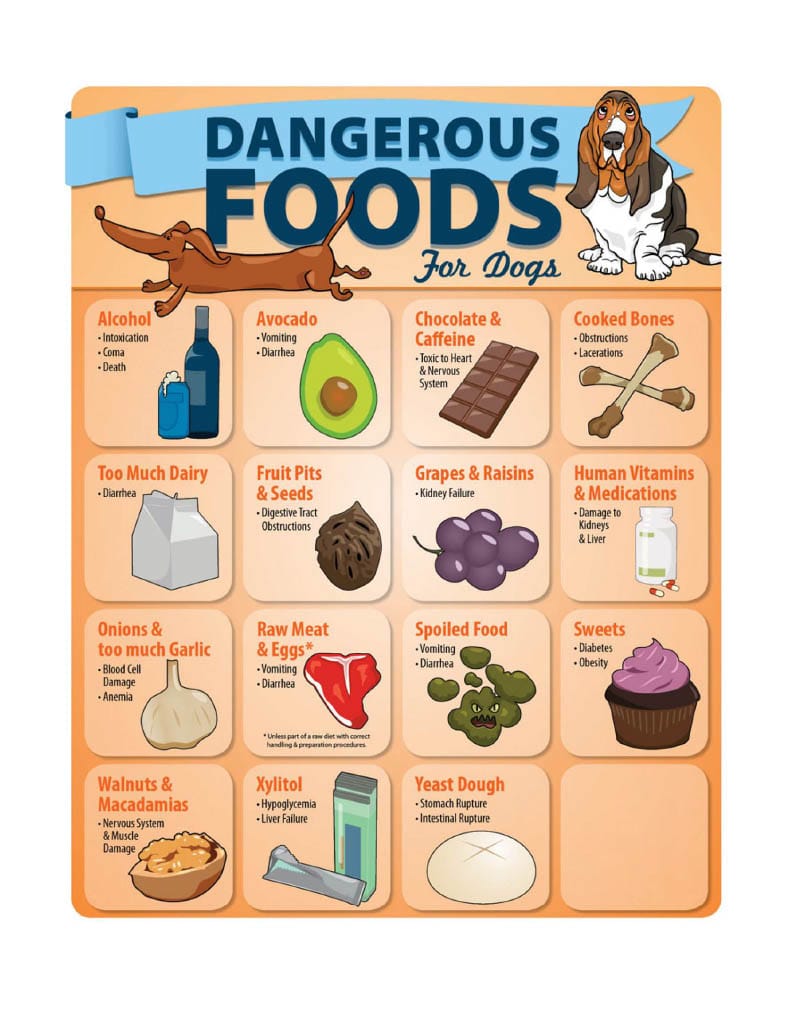As dog owners, we often want to share our meals with our beloved pets. However, it’s crucial to understand that many common human foods can be toxic or dangerous for dogs, leading to severe health issues or even death. This guide details foods that should be strictly avoided to ensure your dog’s safety and well-being.
Foods That Are Toxic for Dogs
If your dog ingests any of the following items, immediate veterinary attention is necessary.
Chocolate, Coffee, and Caffeine
These products contain methylxanthines, which are highly toxic to dogs. Ingestion can lead to vomiting, diarrhea, hyperactivity, abnormal heart rhythms, tremors, seizures, and, in severe cases, death. The darker the chocolate, the higher the concentration of methylxanthines, making baking chocolate the most dangerous. If your dog eats chocolate, coffee, or anything containing caffeine, contact your veterinarian immediately.
Xylitol
This artificial sweetener, commonly found in sugar-free gum, candies, toothpaste, and some baked goods, is extremely toxic to dogs. Xylitol triggers a rapid release of insulin, causing a dangerous drop in blood sugar. Symptoms include vomiting, lethargy, loss of coordination, seizures, and potentially fatal liver failure.
Macadamia Nuts
While seemingly harmless, macadamia nuts are toxic to dogs. Even a small amount can cause weakness, vomiting, tremors, depression, and an elevated body temperature. The exact toxic component is unknown, but these nuts should be completely avoided.
Grapes and Raisins
Grapes and raisins are notorious for causing acute kidney failure in dogs, and the toxic substance remains unidentified. Some dogs may tolerate them, while others can be severely affected by even small quantities. Due to this unpredictability, it’s best to consider grapes and raisins toxic and keep them away from your dog.
Garlic, Onions, and Chives
Belonging to the Allium family, garlic, onions, chives, and leeks contain compounds that can damage a dog’s red blood cells, leading to anemia. Symptoms include weakness, exercise intolerance, vomiting, diarrhea, changes in heart and respiratory rates, red urine, collapse, and death. While cats are more sensitive, dogs can also be severely affected. Dogs can eat garlic in extremely small, processed amounts without harm, but raw and concentrated forms are dangerous.
Alcohol
Alcoholic beverages and products containing alcohol can cause significant harm to dogs. Ingestion can lead to vomiting, diarrhea, difficulty breathing, loss of coordination, tremors, coma, and death. Always keep alcohol securely out of your dog’s reach.
Yeast Dough
Unbaked yeast dough can be dangerous for dogs. As the yeast ferments in the warm environment of the stomach, it produces large amounts of gas, leading to painful bloating and a potentially life-threatening condition called gastric bloat and torsion. Additionally, the yeast produces ethanol, which can cause alcohol poisoning. While most fully baked bread is fine for dogs to eat, raw dough poses serious risks.
Other Foods That Are Dangerous for Dogs
While not immediately toxic, these foods can still cause significant health problems for dogs and should be offered with extreme caution or avoided altogether.
Milk and Dairy Products
Many dogs are lactose intolerant, lacking the enzyme lactase needed to digest dairy. Consuming milk and dairy products can lead to gastrointestinal upset, including vomiting and diarrhea. High-fat dairy products can also trigger pancreatitis, a painful and potentially severe inflammation of the pancreas.
Salt and Salty Snacks
Excessive salt intake can be toxic to dogs, leading to increased thirst and urination, vomiting, diarrhea, and depression. In severe cases, it can cause tremors, seizures, and death. While an occasional dropped potato chip is unlikely to cause harm, salty snacks should not be a regular part of your dog’s diet, especially for dogs with pre-existing heart or kidney conditions. Salt is indeed considered a toxin in large quantities.
Raw Meat, Raw Eggs, and Bones
Feeding raw meat and eggs to dogs carries the risk of bacterial contamination, such as Salmonella and E. coli, which can affect both the dog and its human family. Raw eggs also contain avidin, an enzyme that can interfere with the absorption of biotin, potentially leading to skin and coat issues. Bones can lead to choking, intestinal blockage, or perforation, making them a significant hazard.
Citrus
While small amounts of citrus fruits like oranges, lemons, and limes may not cause serious harm, large quantities or concentrated forms like the peels and seeds can cause gastrointestinal irritation and central nervous system depression in dogs. These fruits should not be a regular dietary staple.
Coconut and Coconut Oil
Small amounts of coconut-containing products are generally not harmful but may cause diarrhea and stomach upset. Coconut water is high in potassium, which could be problematic for dogs with heart or kidney issues.
Nuts
While some nuts are safer than others, most are high in fat and calories, which can lead to digestive upset and pancreatitis. Macadamia nuts and black walnuts are toxic. Almonds and pecans, while not toxic, should also be avoided due to their fat content. Other nuts should be given sparingly and only after careful research into their safety.
What Foods Can Dogs Eat?
While many human foods are off-limits, some can be safely shared with dogs in moderation. Always introduce new foods gradually and in small quantities, ensuring they constitute less than 10% of your dog’s daily caloric intake. It’s advisable to consult your veterinarian before adding any new human foods to your dog’s diet. Commercial dog food is formulated to provide a complete and balanced diet, and overfeeding human foods can disrupt this balance.
Featured Image: iStock/Moyo Studio

